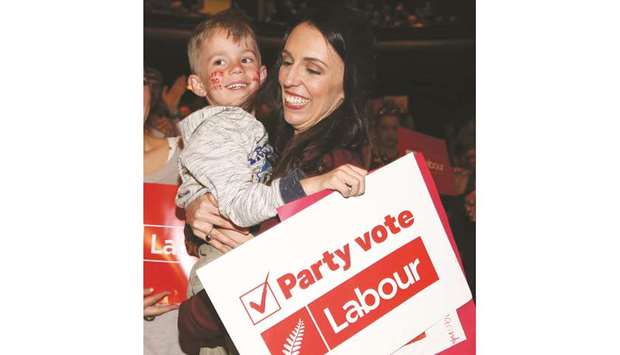Labour had been heading for disaster at the September 23 polls until Ardern took over last month and sparked a surge in support that local media dubbed “Jacinda-mania”.
The 37-year-old has been mobbed at shopping malls and earned comparisons to Canada’s Justin Trudeau and France’s Emmanuel Macron from pundits such as former prime minister Helen Clark. Her rise has wrong-footed Prime Minister Bill English’s conservative National Party, which had been cruising to a record-equalling fourth term. English has dismissed Ardern’s appeal as “stardust”, focusing instead on National’s strong record guiding New Zealand through the global financial crisis and a deadly Christchurch earthquake in 2011.
Ardern herself admits she is surprised at the public’s response to a self-described “policy nerd” who never envisioned herself running for prime minister. “This will go down as the most extraordinary period of my life,” she said on the campaign trail last week.
Ardern grew up in the North Island hinterland, where her father was a police officer. She credits the poverty she saw there with shaping her beliefs.
She was raised as a Mormon but left the faith in her 20s due to its stance against homosexuality. After completing a communications degree, Ardern served her political apprenticeship in Clark’s office before heading to Britain to work as a policy adviser in Tony Blair’s government. She was elected to parliament in 2008 and in March this year became Labour’s deputy leader, confirming her status as a rising star.
At the time, Ardern was viewed as a talented, but still developing, future leadership prospect, unproven in a political dogfight. But Labour’s top job was thrust upon her on August 1, when her predecessor Andrew Little quit after his polling hit 20-year lows of 23%. “Everyone knows I have just accepted, with short notice, the worst job in politics,” Ardern said after becoming Labour’s fifth leader in four years, and the youngest in its 101-year history.
The gamble on a rookie less than two months out from an election appears to have paid off, with some polls showing Labour’s support surging to 44%. Ardern puts that down to a shifting national mood. “There’s a movement for change and I think after nine years people are starting to believe that we’re drifting,” she said.
While acknowledging New Zealand has maintained a robust economy under National, Ardern has argued for a more progressive agenda that addresses social inequality. Housing affordability, free tertiary education, environmental action and improved healthcare have been constant themes at the hustings.
She has also vowed to slash immigration numbers and bar foreigners from buying houses in New Zealand amid fears offshore money is fuelling the rise in property prices. Ardern has also allowed glimpses of her personality to emerge, speaking of her liking for single-malt whisky and short-lived career as a music festival DJ. The former public relations student has a knack for pithy soundbites that cut through the political clamour and grab voters’ attention.
It has proved particularly effective with young voters as Ardern argues for generational change in New Zealand politics. “My generation has been sold down the river by your government” she admonished the 55-year-old English, going on to describe climate change as “my generation’s nuclear-free moment”. Doubts about her temperament evaporated amid several feisty debates with English. Voters also saw a steely side when a TV host told her that New Zealanders had a right to know her plans for parenthood before deciding whether to elect a young woman as prime minister. “It is totally unacceptable in 2017 to say that women should have to answer that question in the workplace,” she responded, wagging her finger at the male presenter.

